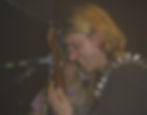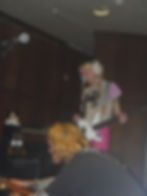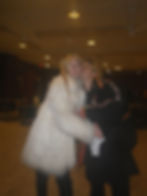Unraveling They Are Gutting A Body Of Water's Blissful Universe
- Dec 19, 2023
- 8 min read
Updated: Dec 22, 2023
Frontman Doug Dulgarian talks starting in the Philadelphia DIY scene, the presence of sincere friendship magic while grappling with drug addiction, corpo-America, and Expansion Pak's visual symmetry to his life.
By: Brittany Deitch

[Credit: Brittany Deitch]
One of the Philadelphia music scene's buzz words, They Are Gutting A Body Of Water (frequently known as abbreviation TAGABOW), has been an essential influence to trance-inducing shoe-gaze and is made up of deliberate intentions, yet to be publicized enough for fans to grasp with a striking intimacy. Doug Dulgarian, leader, front-man, orchestrator of the band is not a friend to most media outlets and does not take many interviews, at least that's what his booking agent told me before I got in contact with him via Bandcamp inquiry message, making the opportunity to chat with him all the more honoring and sincere for mutual friends of the DIY scene.
Dulgarian is anti-corpo, big label, and the things that tend to take away from one's humanness in art. Fortunately, he is pro friends, and the community which true connection yields. He engulfs people with his kind thoughts and champions honesty in his upfront but comforting energy. Discovering its irreplaceable gleam, Doug Dulgarian has been chasing Philadelphia friendship since he abandoned the small pop-punk scene of Albany, NY in 2015 for something revolutionary, telling me he learnt here that "you can have friends who really care about you, and you can really learn to care about people. That was a big, important thing for me. For what it’s worth, that is the power of music."
TAGABOW feels like willfully overloading your system, with harsh layered melodies that jump out at you and force you into their world. They're contagious. With four magnetic full-length albums that have engulfed Philly alt lovers, Dulgarian's brain has generated a cult following for the four piece consisting of himself, bassist Emily Lofing, guitarist P.J. Carroll, and drummer Ben Opatut. When listening to their discography, I feel like I'm running alongside them, attempting to keep up. There's a quickness about them, from antsy slow-core in their 2018 LP gestures been to soul-crushing, jagged competence in their latest (streamable) release lucky styles.
Each finished slice of the band's creative works is culminated out of a long string of writing towards exhibiting a larger experience. Containing extreme sensory language and hyper-specific memories, TAGABOW's audience is utterly mesmerized with their unique archetype of a song. They do not utilize a traditional writing style, and mainly rely on feeling to carry the meaning and production of the work. Dulgarian's notes app is flooded with phrases and thoughts related to one thing, which he contributes to when he feels exactly the right inciting feeling (a process that some might know as inspired writing). "It's often a bigger collection of experience" that cannot be replicated with sitting down and enforcing a front-to-back process. Encompassing nostalgia, grief, and sincerity within it, Dulgarian's discography and recent expansion beyond Philadelphia transmit a very core essence of himself.
To Doug Dulgarian, who resides at his core is encapsulated in the love he surrounds himself with: "It's the way that you think about yourself, like, that's the thing. My whole life I believed that I wasn't worthy of love. That's what I was told when I was a kid through people's actions and shit like that. That's what I was told through the court system. In every which way it was reinforced that I was never gonna be shit, I wasn't shit, and then you kind-of learn— I'm actually worth a lot dude. You learn everything from mirrors of other people. You learn everything through other people. Just having friends is dope, it's a blessing truly."

[Credit: Brittany Deitch]
Before becoming a true friend to us all in Philly, Dulgarian's beginning here wasn't far off from most indie-heads' first archetypal gateway into the city's rich music history. Sometime in 2013 was the first he had heard of Alex G: "I was like, this is weird!" He picked up and left Albany in 2015.
With vastly disparate scenes, Albany is like the shallow end of a swimming pool, not comparable to the "vast ocean" that Philadelphia has to offer. There's a "sincere magic" here that Dulgarian hasn't seen anywhere else (like scenes in cities he has seen on tour, like Salt Lake City, Chicago, and Birmingham, but still soaring with much more love), but he has Albany to thank for showing him to the first house show he had ever been to at age 23, and more synchronistically, his struggle with addiction.
When he was 17 years old, he sold a laptop at a party and caught a charge for it (at least, that's how Dulgarian sums it up). On probation, Dulgarian was led to a therapeutic community in Albany for a year of his life, withdrawing himself from his hometown and into a new sphere of music culture and expansion, radically different from where he grew up in Orange County. "It’s super weird, but without addiction I don’t think I would have found music, and specifically DIY music. Living in Albany, touring through Philly, I was like this rocks I fucking love this place. I was like okay, this is where I want to be. So without the trials and tribulations of addiction, I don’t think I would have made it to Philadelphia," Dulgarian shares.
His first time getting clean and staying that way, Dulgarian was 23 years old. He stayed clean for five years and moved to Philadelphia. He started TAGABOW. When discussing how moving himself into musical devotion contributed to his recovery, it's clear that creativity, and connection through that source, became an origin of light outside of his temporary ailment. "I chased that shit like I chased drugs," he confesses. "I don’t mean chased recovery, or chased humility, or chased integrity, or whatever. I just mean, like, being in a band, and just touring and playing awful fucking shows— playing to nobody. I really honestly had a good time and I wouldn’t have fucking done it any other way. But I chased it the way I chased dope. I really love the feeling of friends."
Genuine connection isn't something that Dulgarian takes for granted now after uncovering it in his life— it's apart of his personal philosophy. And it makes sense. When you go through life unacquainted with the feeling of sincere love, when you finally encounter it, it feels like something you might die without. These beliefs are directly intertwined with Dulgarian's feeling of dread for a lack of humanity in the music industry.
TAGABOW has been in contact with big labels, but never felt like it was something they could sympathize with. When I asked Dulgarian what he has taken from the recent influx of genuine love, he brought it right back to these core beliefs about corporate exploitation of the arts: "There's something that happens with ego that makes you more than a person. I think I'm really trying to avoid that misstep. The music industry in itself really wants to take what you’ve created it and resell it back to these people who are now interested in it. There’s no humanness in that. There’s no humanness in corporate greed. There’s no humanness how the tech companies move into San Francisco, raise the rent, quadruple the rent, everybody’s homeless now, and then all the tech companies left. Now San Francisco is this place where the homeless population has doubled over the pandemic, there’s people fucking dying in the streets because of fentanyl addiction— it’s a really, really tough place to be. What about the people who grew up there? Corporate greed is this really, really ugly fucking thing. Those people don’t have to worry about anything. I feel really similarly about major labels. There’s no humanity to that, dude. They’re just like, we’re gonna get you mad fans! That’s such bullshit— to be like, yo, we’re gonna make you famous. You get stars in your eyes, like, that’s all I ever wanted, to be famous! But the hit is really not in fame. The hit is really just chilling with your fucking friends," he shares.
Acknowledging the importance of small press outlets, like Ratpie Friends and many more essential community enthusiasts in the area (small venues, journalists, event organizers, etc.), Dulgarian harps on the love behind "DIY ethos," labeling them as "the heart and blood of the whole thing." He goes on to talk about the humanness that results from true expression: "Talking about shit that excites you guys— that gets other people pumped. It's a big deal." It makes me feel full to hear someone relate, and assign the same level of significance to genuine art as I do. When something is truly inspired by something deep inside your person, the presence of light within it always shows through.
"Where your heart feels the best is not in fame, and shit like that," he continues. "That’s why I try to keep it up front about where I stand within the world. Like I said, I’m just some hood-rat smuck from Philly, and that’s really important to me. I’m not trying to be some famous bighead. Fame just ruins people."

[Credit: Brittany Deitch]
While the band has stayed true to their DIY roots, they've still managed to book a multitude of successful tours across North America throughout 2022 and 2023, supporting bands like Horse Jumper of Love, Modern Color, Waveform, Teeth— most recently hitting the road alongside Full Body 2 and Null.
They Are Gutting A Body Of Water's live performances are enigmatic, brimming with static and thrill, with a stage presence reminiscent of Blue Smiley with the band members' backs facing the audience, blocking us out like we're hardly there. When questioned about the setup, Dulgarian talks of acquiring the setup from the old experimental Philadelphia band fronted by Brian Nowell: "I was always like, dude, that’s so sick! They don’t even care! They don’t even give a shit about the audience!"
Other bands in the DIY homeland (Philly) have inspired TAGABOW just as much, and some folks outside the city. Null, Full Body 2, Toner (along with all of Smoking Room Records), Hotline TNT are just a few of the bands which Dulgarian hardly hesitated before fervently elevating during our conversation.
It's not just bands that are inspiring TAGABOW's work— their latest release, Expansion Pak, was heavily inspired by visual films like Eraserhead and Dawn of the Dead, containing iconic sounds or soundtracks to accompany the films. Dulgarian wanted to mess around with the way that sounds and visuals interact with one another, and utilized an eery visual medium to do so. The film contains 11 separate tracks that amalgamate into a 22 minute story, only available on YouTube.
Expansion Pak was inspired by the passing of one of Dulgarian's close friends, created with the intention to process his death. The film symbolizes people coming in and out of our lives, utilizing an element of fleeting characters— you visually connect with them but they're not permanent, they're just in and out of the story. Dulgarian shares that the story is meant to "mimic what friendships feel like or connections with other people feel like. They’re kinda fleeting. You can love somebody forever and very, very deeply, but will they be present in your life forever? No. There’s no way for that to happen, but the amount of time you do spend with them often leaves a lasting impact."
Dulgarian's openness is gut-wrenchingly relatable and easy to insert yourself into for anyone enduring the human experience— for anyone alive at all. "Everybody has people in their life who leave or die. Nobody is fucking immune to that," Dulgarian concludes.
Find TAGABOW's visual album Expansion Pak on YouTube, and discover more of the band online. (⌒▽⌒)☆
⋅•⋅⊰∙∘˗ˏˋ ˚₊‧꒰ა ☆ ໒꒱ ‧₊˚ ˎˊ˗∘∙⊱⋅•⋅
Brittany Deitch is a Philadelphia college graduate, house show enjoyer, and freelancer for Paste Magazine. Find her work online elsewhere via @brittanydeitch (twitter/IG). She is also on Substack via https://theworstpersonintheworld.substack.com/.
